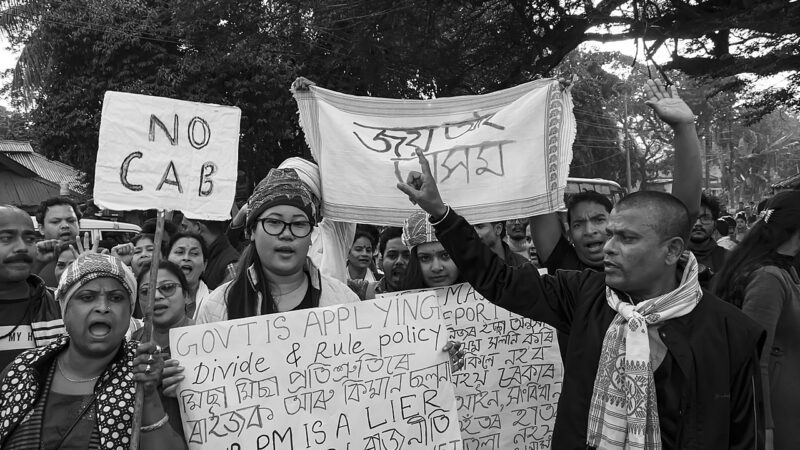The Citizenship Amendment Act (Bill) protests, also known as CAA Protests, occurred after the Citizenship Amendment Act (CAA) was enacted by the Government of India on December 12, 2019. Image via Wikipedia by Dr Vikramjit Kakati. (CC BY-SA 4.0 DEED4.0).
On March 11, the Bharatiya Janata Party (BJP)-led Indian government implemented the highly controversial Citizenship Amendment Act, 2019. The act (law) seeks to grant citizenship based on religious grounds; however, it is being criticised for having an anti-Muslim bias.
The right-wing BJP government of Narendra Modi implemented the law just a few weeks before India's upcoming general election, which is why it has become crucial in the country's politically charged atmosphere. Many political analysts and opposition leaders claim that this has been intentionally done to polarize voters on the basis of religion so the BJP can get an advantage in the election.
What is the CAA?
The current Citizenship Amendment Act, 2019 (CAA) is an amendment to the 1955 Citizenship Act of India. It was introduced in the parliament in 2016 and passed in December 2019.
According to the previous act, a foreign national seeking Indian citizenship through naturalization must spend 11 years in the country to become eligible. However, this new law is changing this aspect.
The CAA now grants citizenship to six religious communities, including Hindus, Parsis, Sikhs, Buddhists, Jains, and Christians, who escaped to India because of religious persecution in Muslim-majority Pakistan, Afghanistan and Bangladesh before December 13, 2014. It also aims to grant citizenship to applicants from these faiths who have been living in India illegally or with long-term visas for a period of five years. A local priest (pujari in Hindi) can also issue an eligibility certificate to validate the religion of an applicant seeking citizenship through the CAA. This certificate is among the documents that must be submitted by applicants seeking citizenship.
Why it is criticised as an anti-Muslim law
Until the CAA, India did not have any rules regarding religion as a factor in obtaining citizenship. Those who were legally residing in India for at least 11 years could apply for citizenship through naturalization, irrespective of religion.
However, the CAA changes that structure, bringing religion into India’s citizenship law as a requirement for the first time ever. This also restricts migrants from other religions, especially Muslims, from obtaining Indian citizenship, and they would require proper documents and reasons to justify their presence in India.
The law notably violates Article 14 of the Indian constitution, which ensures equality for everyone and equal protection before the law within the Indian territory.
In December 2019, after the act was passed in parliament, the country witnessed massive protests against this discriminatory law. The protests have drawn participation from all stakeholders of society, including students and women.
On March 11, human rights watchdog Amnesty India, posted on X (formerly Twitter) about the “discriminatory” nature of the CAA:
The Citizenship Amendment Act (CAA) is a discriminatory law that goes against the constitutional values of equality and international human rights law. The notification of the rules issued by the Ministry of Home Affairs will make this divisive law operational from today. #CAA
— Amnesty India (@AIIndia) March 11, 2024
How is CAA linked with National Register of Citizens?
The National Register of Citizens (NRC) stores information about all legal Indian citizens to identify illegal immigrants.
The demand for a correct and updated NRC first started in the northeastern Indian state of Assam. In the 1980s, several Indigenous Assamese organizations, led by the All Assam Students Union (AASU), initiated the “Assam Movement,” claiming the presence of many illegal Bangladeshis in the state. The movement concluded with the signing of the “Assam Accord” between AASU and the government of India, stipulating the implementation of a fully updated NRC in Assam.
In 2016, the BJP formed the government in Assam for the first time. The BJP-led state government promptly began the process of updating the NRC, requiring all citizens to prove their nationality. Residents had to be able to prove they came to the state by March 24, 1971, two days before neighbouring Bangladesh declared independence from Pakistan. On August 31, 2019, the final draft of the NRC was published, resulting in nearly 1.9 million people being rendered stateless.
After the CAA was passed in parliament, the majority of critics became apprehensive that the BJP-led government would also try to combine the NRC with the CAA. Many top BJP politicians, including Assam's chief minister Himanta Biswa Sarma, have even demanded that the NRC be implemented nationwide and that the government should identify illegal citizens and deport them.
However, the NRC in Assam was full of anomalies, as a large number of legitimate Indian citizens were left out of the final draft, causing a drastic citizenship crisis. Even though India’s prime minister denied that an NRC process would follow the CAA, in the 2023 Karnataka state assembly election, the party included an updated NRC as a promise in its election manifesto in the state, making it a top agenda for the BJP February 2020, resulting in 53 deaths, most of whom were Muslims. Also, many anti-CAA protesters were arrested under the Unlawful Activities Prevention Act (UAPA), a stringent law.
What’s next for the CAA?
Sporadic protests erupted nationwide after the government implemented this controversial law in March 2024. In Tamil Nadu, the southernmost state of India, the ruling Dravida Munnetra Kazhagam-led government vowed not to implement the CAA. The Communist Party of India (Marxist), the ruling party of the south Indian state of Kerala, also protested against the CAA on March 12, 2024.
Protests are much more intense in the northeastern Indian states, especially in Assam, which shares a boundary with Bangladesh. Many social organizations protested and held rallies, vowing not to accept the CAA in the state. The All Assam Students Union held a candlelight march in Guwahati and labeled the act as Anti-India and Anti-Northeast. It is worth mentioning that Assam had witnessed violent anti-CAA protests in 2019. To prevent similar widespread protests this time, the Assam police warned of taking legal action and recovering the cost of any damage to public properties from the protestors. The director general of police, Assam, G. P. Singh, posted many times on X and also sent letters to opposition parties as a warning not to carry out protests.
Ripun Bora, the president of Assam state's Trinamool Congress, took to X and protested against Assam Police’s efforts to curb the democratic protest:
Dear @gpsinghips ,protest is our democratic right. We won't bow down to the dictatorship of the BJP Government.
By sending such notice/warning letter it is an attempt to curtail our democratic rights.
We will stand with the people of Assam, whatever the consequences.#CAA pic.twitter.com/fkWJhqMyI5
— Ripun Bora (@ripunbora) March 12, 2024
Apart from the street protests, civil organizations and individuals have also filed petitions against the discriminatory CAA in the Supreme Court of India. As of now, there are over 200 petitions in the Supreme Court of India challenging the unconstitutional nature of the act. However, even after the petitions and public protests, the law has come into effect.

.png) 1 month ago
1 month ago

















 English (US) ·
English (US) ·